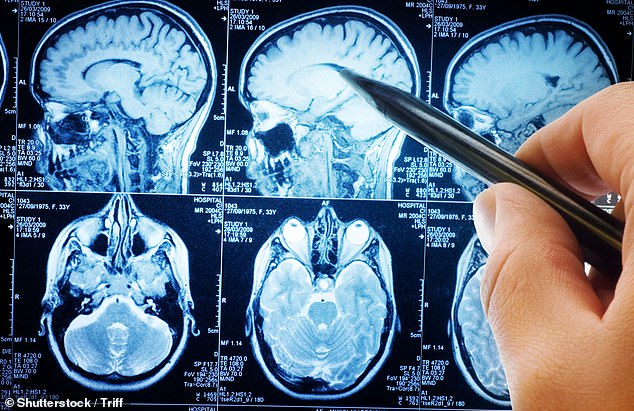[ad_1]
Living with mental health conditions could ‘strongly’ raise the risk of developing dementia, concerning research has suggested.
Studies have long linked depression, anxiety and bipolar disorder individually, with an increased risk of the memory-robbing condition.
But in a first-of-its-kind study, French researchers found that people with multiple mental health conditions were up to 11 times as likely to have dementia than those with one mental health diagnosis.
Patients with a mood disorder, such as depression or bipolar disorder, as well as anxiety, increased their odds of dementia by up to 90 per cent, the scientists also claimed.
Experts today labelled the research important, but cautioned that given the findings were merely observational, it could not prove the conditions directly cause dementia.
Writing in the journal BMJ Mental Health, scientists at Paul Brousse Hospital in Paris, said: ‘The findings of this study highlight the strong association between the co-occurrence of psychiatric disorders and an increased posterior probability of developing dementia, particularly for patterns with anxiety and mood disorders.
‘Recent advancements in dementia diagnoses, such as the development of biomarkers in blood and cerebrospinal fluid encourage earlier and more accurate detection of dementia.
‘Integrating these tools into clinical practice for high-risk individuals, could significantly enhance their care, given the recent advancements in dementia treatment.’

Studies have long linked depression , anxiety and bipolar disorder individually with an increased risk of the memory-robbing condition
In the study, researchers assessed the medical records of 3,688 people aged 45 on average, over a follow-up of at least five years—all were patients in the psychiatry department of Bicêtre Hospital, Paris.
They had been diagnosed with one or more of the most common mental health conditions—depression, anxiety, psychosis, substance misuse, personality disorder or bipolar disorder—between August 2009 and October 2023.
Just over 70 per cent (2608) had one diagnosis, while 21.5 per cent (789) had two.
Six per cent (226), meanwhile, had three and two per cent (65), had four or more.
After accounting for factors that could skew the results, such as age and other diagnosed health conditions, the researchers found that compared with those with one mental health condition, those with two, were twice as likely to be diagnosed with dementia.
Patients with three mental health diagnoses were more than four times as likely to do so, the researchers said.
And those with four or more, were 11 times as likely to have dementia.
In particular, the combination of a mood disorder and anxiety was linked to increased odds of dementia of up to 89.6 per cent.

Around 900,000 Brits are currently thought to have the memory-robbing disorder. But University College London scientists estimate this will rise to 1.7million within two decades as people live longer. It marks a 40 per cent uptick on the previous forecast in 2017
Writing in the journal, the scientists said the findings suggest that having more than one mental health condition could be an early warning sign of dementia.
‘Targeted screening strategies should be developed for these patients, with a special focus on patients developing more than one psychiatric disorder,’ they added.
The researchers acknowledged, however, that the study had some limitations including the fact all study participants were patients at the same psychiatric department.
‘This ensures diagnostic consistency but limits how we can generalise to broader populations’ and may not be representative of all patients with mental health disorders, they noted.
Influencing factors such as family health history and duration of psychiatric disorder, equally, weren’t considered, the scientists said.
Latest statistics show that the number of people in the UK seeking help for mental illness has surged by two fifths since before the pandemic, reaching almost 4million.
Meanwhile, the latest figures from the Office for National Statistics (ONS) show almost a quarter of children in England now have a ‘probable mental disorder’—up from one in the five in the previous year.
It comes as a landmark study last year suggested almost half of all Alzheimer’s cases could be prevented by tackling 14 lifestyle factors from childhood.
World-leading experts found two new risk factors—high cholesterol and suffering vision loss—were, combined, behind almost one in ten dementia cases globally.
They join 12 existing factors, ranging from genetics to smoking status, that experts have identified as increasing the risk a person would suffer dementia.
Experts claimed the study, published in the prestigious journal The Lancet, provided more hope than ‘ever before’ that the memory-robbing disorder that blights the lives of millions can be tackled.
Alzheimer’s Disease is the most common form of dementia and affects 982,000 people in the UK.
Memory problems, thinking and reasoning difficulties and language problems are common early symptoms of the condition, which then worsen over time.
Alzheimer’s Research UK analysis found 74,261 people died from dementia in 2022 compared with 69,178 a year earlier, making it the country’s biggest killer.
[ad_2]
This article was originally published by a www.dailymail.co.uk . Read the Original article here. .

